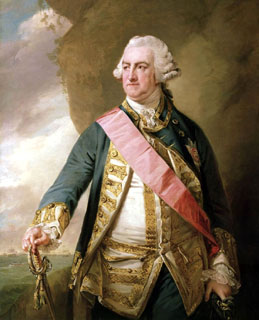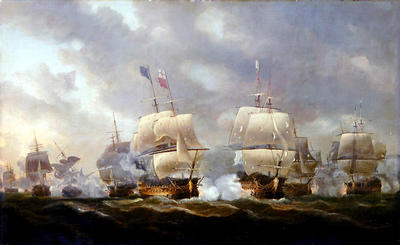February 21, 2006
Gratuitous Royal Navy Geek Posting (TM)

Today is the birthday of Edward Hawke, born this day in 1705.
Hawke was the admiral in command of the British fleet that won the Battle of Quiberon Bay on November 20, 1759, during the Seven Years' War.

The Battle of Quiberon Bay by Nicholas Pocock, 1812. Image swiped from the National Maritime Museum.
The battle, which the great A. T. Mahan called the Trafalgar of the Seven Years' War, effectively put an end to French naval power, with two important consequences. First, it quashed any threat of a French invasion of Britain, thereby freeing for foreign service British troops who had been stationed at home to guard against such threat. Second, it meant that the French could no longer send critical supplies and reenforcements to their army in North America or its Indian allies, thus pretty much sealing the doom of French Canada.
For you Patrick O'Brian fans out there, Hawkes' victory at Quiberon Bay also was the inspiration for the Royal Navy song "Hearts of Oak":
Come cheer up, my lads! 'tis to glory we steer,
To add something more to this wonderful year;
To honour we call you, not press you like slaves,
For who are so free as the sons of the waves?Chorus
Heart of oak are our ships, heart of oak are our men;
We always are ready, steady, boys, steady!
We'll fight and we'll conquer again and again.We ne'er see our foes but we wish them to stay,
They never see us but they wish us away;
If they run, why we follow, and run them ashore,
For if they won't fight us, we cannot do more.Chorus
They swear they'll invade us, these terrible foes,
They frighten our women, our children, and beaus;
But should their flat bottoms in darkness get o'er,
Still Britons they'll find to receive them on shore.Chorus
We'll still make them fear, and we'll still make them flee,
And drub 'em on shore, as we've drubb'd 'em at sea;
Then cheer up, my lads! with one heart let us sing:
Our soldiers, our sailors, our statesmen and King.Chorus
Here is a midi-file of the tune, written by William Boyce. The words were by David Garrick, the famous late 18th Century British actor who also coined the theatrical good luck expression "break a leg".


 Image courtesy of the lovely and talented
Image courtesy of the lovely and talented 